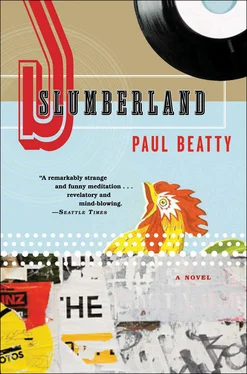Cuff links sparkling in the spotlight, Stone raised his arms and hushed the crowd.
“On those days when I wake up realizing my life has been lived in vain, I come here to the Slumberland. Let me rephrase that: I never knew my life had been lived in vain until I came to the Slumberland and heard that jukebox.”
“Die größte Jukebox in der Welt!” someone, who sounded suspiciously like Klaudia, shouted.
From its corner the jukebox flashed and flickered its lights in appreciation.
“This is a man who’s turned the jukebox into a modern-day oracle. You put your money in the slot and Bill Withers answers a question you didn’t think you had, Aretha Franklin distills advice you didn’t think you needed, Tom Petty and the Heartbreakers predict your future. He’s a man who’s synthesized every sound ever heard and every feeling ever felt. Ladies and gentlemen, I give you…”
He never finished his sentence. He’d forgotten my name, hoping “the look” would suffice as an apology for his mental lapse and my anonymity.
“The look” sufficed. I’d waited all my life for someone to give me that look. The look Duke gave Johnny Hodges. Bob Marley gave Peter Tosh. George Clinton gave Bootsy. Benny Goodman gave Charlie Christian. Billie Holiday gave Lester Young. Chuck D gave Flavor Flav. Alvin gave the Chipmunks. The look that said, “Do your thing, motherfucker.”
I didn’t mince music. I slapped the crossfader and hit them straight with the beat. No grease. The room went reverential. Folks sat down and listened with the rapt attentiveness of campers hearing their first fireside ghost story. Those on the outside pressed their regretful faces against the windows and the skylight. I knew, somewhere, my boy Blaze was listening in on the international feed, clapping his hands and nodding his head. “Oh, hell yes. It’s about time, fool.”
I was scared. Scared that I would die before we finished. I wanted time to stop but not forever.
The Schwa was frightened too. Even though he’d been expecting a miracle, he wasn’t quite ready for the thoroughness of the boom. His hands shook. He was faltering, unsure of himself. It was then I shot him the look. Do your thing, motherfucker .
The Schwa leapt onto the track. Tackling and attempting to subdue his instrument as if it were a wild swamp gator roused from a deep, satisfying sleep. The first note he hit was pure paterfamilias. Its sound wave so concussive it flapped my clothes, shook the walls, and caused one audience member to exclaim, “Yes, Father?”
If you ever attend a poetry or jazz workshop to learn the mystical art of improvisation, invariably the instructor will say to you, “First thought, best thought.” It’s a faux-Buddhist axiom that has led to nothing more than some wildly uneven Beat literature and some shaky second-half play calling by the Los Angeles Rams in Super Bowl XIV, but it sounds good. Personally, I never believed in improvisation. Listen to any cat freestyle or solo — Dizzy, Biggie, Bessie, or Ashbery — they’re not playing the way they want to play, they’re trying to play the way they want to play. No one ever sounded exactly the way they wanted to sound. But that night the Schwa convinced me otherwise. Without trying, he played exactly the way he wanted to play, and when I say he wasn’t trying, I don’t mean he wasn’t putting forth any effort, I mean there was no pretense. He simply played his ass off, blessing my beat with brilliant new neo-bop and retro-cool interstices that filled voids both musical and spiritual.
In the advanced poetry and jazz-improvisation workshop the instructor will invariably say, “Don’t think. If you think, you’re dead.” Of course, it’s the obverse that’s really true. If you’re not thinking, you’re dead, and I didn’t need to look at the Schwa’s knitted brow and gritted countenance to know that Charles Stone was deep in thought. I just had to listen.
He was switching up the tempo. Segueing from a frenzied fortissimo to a languid legato by quoting from “Lift Every Voice and Sing,” the Negro national anthem. It’s a beautiful yet trepidatious song, and especially so in his hands. Musical mason that he was, the Schwa erected a series of African-American landmarks upon the foundation I had laid down. The contrapuntal effect of our discordant architectural styles meshed together wonderfully. One moment the beat was a towering black obelisk, the next it was an ebony-walled Taj Mahal. The music was so uniquely majestic I felt like stepping outside of the song. A dis-embodied DJ floating out into the audience, putting a proud arm around his unborn child, and saying, “See that song? Hear that music? Daddy helped build that.”
Despite the tune’s genius, in my mental landscape where blackness is passé, his quoting the Negro national anthem was a blatant violation of the zoning laws. By constructing a new black Berlin Wall in both my head and the city, he was asking me to improvise. Prodding me to tap out an unpremeditated beat on the drum pads, compress the bass line, and add some shama lama ding-dong to the groove. He was daring me to be “black.”
But blackness is and forever will be passé and I held my compositional ground, hit my presets, and leaned on my turntables, furiously scratching the coda. The audience roared and shouted for more. Hands so sweaty that my slippery fingers had trouble staying on the vinyl, I continued to scratch, lacing the beat with a dense, undulating buzz that I cribbed from a nest of agitated hornets I found during a late-night stroll along the Spree.
I shall not be moved
Like a tree that’s planted by the water
I shall not be moved
Forced to relent to my racial and turntable obstinacy, the Schwa deconstructed “Lift Every Voice and Sing” by laying out like a suicidal Acapulco cliff diver who could give a fuck about timing the tide. He paused, then took a deep breath and cannonballed into his own tune, unleashing a voluminous splashing salvo of triplets that shattered and scattered the song into a wave of quarter, half, whole notes that fluttered to the floor in wet, black, globular droplets.
My beat parfait complete, I leaned into the microphone, “Ladies and gentlemen, Charles Stone. Thanks for coming out, drive home safely, and remember, ‘All art is propaganda.’ ”
Each of us exhausted and covered in sweat, the Schwa and I met at center stage. Over those past two and a half minutes we’d spilled more inner secrets than Anna Freud and Deep Throat combined, but having been in Germany too long and deeply influenced by a country where one has two or three friends and everyone else in your life is an acquaintance, we didn’t know whether to hug, shake hands, or kiss.
From outside I could hear police sirens blare and kids, amped up on caffeine drinks and our extraordinarily powerful encore, jumping on cars and setting fires. It wasn’t a case of the devil’s music spurring the youth to act a fool. It’s not rock ’n’ roll or hip-hop that’s to blame: After all, Daniel Auber’s opera La Muette de Portici set off the Belgian Revolution, and long before the Paris rap riots, a wolf pack of rich old ladies went absolutely buck wild on the Champ-Élysées following the debut of Stravinsky’s Rite of Spring . It’s the touch of sound. Sound is touch and nothing touches you like good, really good, music. It’s like being masturbated by the hand of God. Having the siroccos cooing softly into your ear. It’s Mama’s lullaby gently stroking the neurons in your auditory cortex.
The cops were getting closer and Doris tried to hurry us outside before we would get arrested. The Schwa gripped me by the shoulders like a man trying to be fatherly and keep his distance at the same time. Our conversation was short and sweet.
Читать дальше












